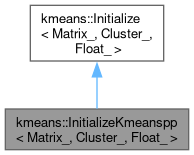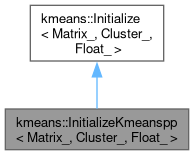kmeans::InitializeKmeanspp< Index_, Data_, Cluster_, Float_, Matrix_ > Class Template Referencefinal
k-means++ initialization of Arthur and Vassilvitskii (2007). More...
#include <InitializeKmeanspp.hpp>
Inheritance diagram for kmeans::InitializeKmeanspp< Index_, Data_, Cluster_, Float_, Matrix_ >:

Collaboration diagram for kmeans::InitializeKmeanspp< Index_, Data_, Cluster_, Float_, Matrix_ >:

Public Member Functions | |
| InitializeKmeanspp (InitializeKmeansppOptions options) | |
| InitializeKmeanspp ()=default | |
| InitializeKmeansppOptions & | get_options () |
 Public Member Functions inherited from kmeans::Initialize< Index_, Data_, Cluster_, Float_, Matrix_ > Public Member Functions inherited from kmeans::Initialize< Index_, Data_, Cluster_, Float_, Matrix_ > | |
| virtual Cluster_ | run (const Matrix_ &data, Cluster_ num_centers, Float_ *centers) const =0 |
Detailed Description
template<typename Index_, typename Data_, typename Cluster_, typename Float_, class Matrix_ = Matrix<Index_, Data_>>
class kmeans::InitializeKmeanspp< Index_, Data_, Cluster_, Float_, Matrix_ >
class kmeans::InitializeKmeanspp< Index_, Data_, Cluster_, Float_, Matrix_ >
k-means++ initialization of Arthur and Vassilvitskii (2007).
Selection of starting points is performed via iterations of weighted sampling, where the sampling probability for each point is proportional to the squared distance to the closest starting point that was chosen in any of the previous iterations. The aim is to obtain well-separated starting points to encourage the formation of suitable clusters.
- Template Parameters
-
Index_ Integer type of the observation indices. This should be the same as the index type of Matrix_.Data_ Numeric type of the input dataset. This should be the same as the data type of Matrix_.Cluster_ Integer type of the cluster assignments. Float_ Floating-point type of the centroids. Matrix_ Class satisfying the Matrixinterface.
- See also
- Arthur, D. and Vassilvitskii, S. (2007). k-means++: the advantages of careful seeding. Proceedings of the eighteenth annual ACM-SIAM symposium on Discrete algorithms, 1027-1035.
Constructor & Destructor Documentation
◆ InitializeKmeanspp() [1/2]
template<typename Index_ , typename Data_ , typename Cluster_ , typename Float_ , class Matrix_ = Matrix<Index_, Data_>>
|
inline |
- Parameters
-
options Options for kmeans++ initialization.
◆ InitializeKmeanspp() [2/2]
template<typename Index_ , typename Data_ , typename Cluster_ , typename Float_ , class Matrix_ = Matrix<Index_, Data_>>
|
default |
Default constructor.
Member Function Documentation
◆ get_options()
template<typename Index_ , typename Data_ , typename Cluster_ , typename Float_ , class Matrix_ = Matrix<Index_, Data_>>
|
inline |
- Returns
- Options for kmeans++ partitioning. This can be modified prior to calling
run().
The documentation for this class was generated from the following file:
- kmeans/InitializeKmeanspp.hpp
Generated by